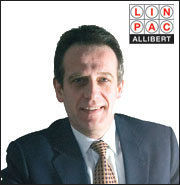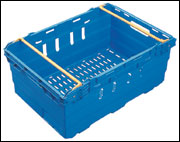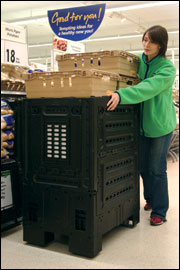 There’s never been a better time for manufacturers and retailers to make Reusable Transit Packaging (RTP) a central part of their supply chain. LINPAC Allibert, a global company offering a one-stop Reusable Transit Packaging service, has the world’s largest range of RTP products. Uniquely qualified to help customers get the best results from the technology, the company offers an integrated service to deliver the products on time in the volume required, backed by the market understanding to give them the best possible service for their business. Danilo Olynik, LINPAC Allibert’s UK Commercial Director, spoke to The Grocery Trader.
There’s never been a better time for manufacturers and retailers to make Reusable Transit Packaging (RTP) a central part of their supply chain. LINPAC Allibert, a global company offering a one-stop Reusable Transit Packaging service, has the world’s largest range of RTP products. Uniquely qualified to help customers get the best results from the technology, the company offers an integrated service to deliver the products on time in the volume required, backed by the market understanding to give them the best possible service for their business. Danilo Olynik, LINPAC Allibert’s UK Commercial Director, spoke to The Grocery Trader.
The Grocery Trader – The present LINPAC Allibert business came about following LINPAC’s purchase of Allibert Buckhorn. When did LINPAC buy Allibert Buckhorn?
The merged company came into being on 1 February 2007. The integration is now complete and we’re operating as one organisation, which is much better for the customer. Like a swan swimming, all appears calm on the surface but there’s a huge amount going on underneath! For example, we’ve just switched to a single ERP system. We have a merged sales force, customer service team and supply chain. We’ve put in a great deal of work, and it’s paying off.
GT – What’s changed as a result?
LINPAC Materials Handling (LMH) was a big, high volume provider of customised products to a large blue-chip customer base. Allibert was characterised by a more agile service ethos directed towards smaller customers. As the one company, we combine both those qualities. We aim to offer an exemplary service and unparalleled range of products to all our customers, large or small.
There’s now a single product range, admittedly with some overlap, but less than you might expect: our aim is to take the ex-Allibert offer to the ex-LMH customers and vice versa, and we’re making good headway.
GT – When did you (Danilo) take on your present job? What were you doing before?
I joined in December 2006, just before the acquisition. I’ve held senior sales and marketing roles with large companies in B2B markets and industries as diverse as automotive components, paper-based packaging and personal protective equipment. Before LINPAC Allibert, I worked in Continental Europe and North America.
GT – What is your brief as Commercial Director?
I’m responsible for our overall sales and marketing population – everyone facing customers, either in the field or internally, in marketing and customer support. My objective is to raise our game and improve our calibre.
 GT – What do you define as reusable transit packaging? How many trips is it good for?
GT – What do you define as reusable transit packaging? How many trips is it good for?
RTP is what it says, packaging used for transporting goods between the supplier, the warehouse or distribution centre and the point of sale. When it is empty, it is returned and used again. Unlike primary packaging, RTP is not taken home by the customer. RTP has a working life of 10-15 years; it is designed to withstand the rigours of the supply chain. We’re making products that last over a decade, which is the major component in the rationale for RTP versus disposable packaging.
GT – What proportion of transit packaging in circulation in Europe is RTP? What about in the UK?
I believe there are over 2 billion reusable plastic containers in circulation in the EU. This represents 30% to 35% of the overall traffic of goods. The rest is still predominantly in pulp-based paper and carton packaging, and a minor proportion remains in wood or metal.
75% of RTP in circulation today is in the retail environment and predominantly in food distribution, which is characterised by high volume, high stock turn, perishable goods. This is pretty uniform, certainly throughout Western Europe, and in the UK alone I estimate we have over 140 million units in circulation. That’s grown by 100% in the last decade, and I think we’ll see it grow as much again. With more and more goods being imported from further afield, RTP has a huge role to play in reducing waste and packaging going to landfill.
GT – For readers who may not have previously considered reusable transit packaging, what are the benefits of using it?
RTP’s advantages and benefits over limited life and one-trip disposable packaging are overwhelming. RTP offers major cost savings over these two forms of packaging, paying for itself many times over during its life, it gives greater protection for goods in transit, increased security for high value products, faster merchandising times, and saves money and carbon miles.
RTP is manufactured to close tolerances, so is suitable for automated supply chains.
It allows quicker turnaround and restocking for fresh produce, with trays and bulk units forming attractive merchandising displays.
RTP folds or nests for efficient reverse logistics of empty trays, and frees vehicles for supplier collections. RTP contributes to improved Health and Safety, and all plastic materials can be recycled.
GT – What kind of figures are we talking about in terms of cost savings?
From our estimates, RTP costs an average Euro 0.45 per trip per container, versus Euro 0.90 per trip for the best one-trip alternatives. RTP can cut the cost of the ‘trip’ by up to 50%, and the longer the life of the asset, the bigger the saving. Ten years isn’t unusual: compare that to a corrugated box used just once!
Following the introduction of RTP, our customers have benefited from up to 56% improvements in stock density in display areas, sales increased by 6%-24% in grocery distribution, and merchandising times reduced by up to 50%.
Using RTP to replace 1 million corrugated one-trip cases would eliminate 0.75 million tonnes of waste and save £1/2m per annum.
GT – What are the environmental benefits of RTP?
RTP is friendlier for the environment, both directly and indirectly. RTP can deliver tremendous economic improvements in supply-chain efficiency. For conventional single trip disposable packaging methodologies, to achieve similar throughput would be immeasurably more expensive and environmentally damaging.
RTP achieves dramatic reductions in packaging waste, and delivers a double whammy. A container that is used again and again equates to many hundreds of corrugated containers that would otherwise need to be disposed of by incineration or disposal to landfill. RTP is the industrial equivalent of the bag-for-life concept, and can be fully recycled and used again to manufacture new containers.
GT – How much stronger and more protective is RTP than other transit packaging?
RTP is much more resilient to the factors that can compromise the integrity of other more traditional packaging forms, such as temperature, humidity, manhandling, vibration and damage from forklift trucks.
RTP is suitable for delicate, perishable, high value or hazardous products. We make models that include tamper-evident security.
GT – Talk us through the LINPAC Allibert RTP range. What’s your biggest selling single line?
LINPAC Allibert’s iconic product is the MAXINEST tray, used in all supermarkets for fresh vegetables. They are filled and replenished daily, going from farm to store and returned via washing facility. There are over 50 million trays circulating in the UK, of which we’ve supplied over 90%. We also make MAXIPAC bulk units for carrying and merchandising loose vegetables and packaged products such as eggs or crisps.
Our other well-known product is the OMEGA Tray. It was created as part of a project for Tesco, to design a standard new container for use by all their UK bakery suppliers. We devised a tray that stacks and travels on a dolly and enables bread to be re-merchandised quickly. We supply 95% of all RTP used in bakery.
 GT – What bulk merchandising pallet cases do you supply?
GT – What bulk merchandising pallet cases do you supply?
We’ve created some light duty variations on the MAXIPAC, and can introduce manufacturers’ graphics and retailer branding to the surrounding structure to create an attractive point-of-sale unit. Why is this important, you ask? Retailers tell us that the last 50 yards to the shelf account for 4%-5% of the cost of the product. This means the search for shelf-ready packaging or retail-ready packaging that reduces the time, labour and cost of placing the product ready at the consumers’ fingertips is of the highest importance. LINPAC Allibert offers retail ready pallets, dollies and roll cages that do just that.
GT – Where are the RTP items you sell here developed and made?
LINPAC Allibert has two UK manufacturing locations and plants in France, Germany and Spain. Our two plants here are being rationalised, to make Winsford the best in class for moulding technology.
As Europe’s industrial centre of gravity moves east, customers look to us to support them in Central Europe, and we’re looking to relocate machine tools and establish permanent plants in these countries. We have design resources across Europe, and work closely with customers on tailored solutions.
GT – What services do you offer to support reusable transit packaging?
RTP is a valuable investment for the customer, and therefore it merits being protected, looked after and maintained. We provide full Asset Management, covering repair, washing, de-kitting all waste materials and asset tracking. We have our own RFID technology in-house, which gives our customers the ultimate in asset tracking technology whilst also enabling them to make use of real-time data capture to re-engineer their replenishment processes, and avoid costly stock-outs or obsolescence.
LINPAC Allibert never abandons its products. We manage their continuous lifecycle from design, manufacturing, finance and operation to recycling.
GT – What proportion of LINPAC Allibert’s UK business is RTP? What’s different about the UK as a market place for RTP?
Our business is 100% RTP. The main difference in RTP use between the UK and Continental Europe in the retail arena is that here retailers tend to own their crates, whereas in Europe there are some large pooling operations which rent them to retailers. These pooling organisations are important stakeholders for us when selling in Europe.
GT – What share of the UK RTP business does LINPAC Allibert have? What about in Europe?
We are the market leader in the UK, and number one or two in most of the markets in which we operate in Europe.
GT – How do you go about supplying tailored RTP solutions for clients?
We have key account teams in the UK and throughout Europe. We always work in partnership with our clients, whose supply chains often cross continents, to ensure we can provide the best service wherever their supply chain reaches. It’s a bit of a cliché, but we try to sell solutions rather than a product. It’s only by taking the trouble to really understand the intricacies of our clients’ supply chains that we can truly realise the value of RTP.
GT – What external factors do you see impacting on demand for RTP?
The green agenda is very much in our favour. The man in the street might think plastics are a pariah, but I think RTP is in fact an enabler, helping retailers to have a greener supply chain, reducing carbon miles and product wastage. As financial pressures and commercial pressures on our retailers increase, the greater is the opportunity for LINPAC Allibert to provide even more valuable solutions designed to help them be more efficient. Win-win is another old cliché but it’s true. LINPAC Allibert will succeed by enabling our customers to succeed.
GT – Where do you see RTP and LINPAC Allibert going from here?
Onwards and upwards. Higher, harder and faster. The green pulpit is already very crowded, but there is a huge opportunity for RTP to reduce costs for consumers, reduce waste and help society be greener. This is a question of morality as well as economics.
Our discussion today has focused on grocery distribution, but there are many other end-user industries with complex and challenging supply chains. Our products are used in automotive, in general industry, in hospitality and catering, in health and welfare.
We’re aiming to go from strength to strength. As a new business with a new identity we need to establish LINPAC Allibert and what it stands for in the hearts and minds of users and of the man-in-the-street. We want to be the Microsoft of RTP.
If that’s not enough, let me remind you that LINPAC Allibert is part of the LINPAC Group, which has a breathtaking array of complimentary technologies in primary packaging and recycling. My colleagues around the globe and I are acting to mobilise the resources and capabilities of the entire group.




Comments are closed.